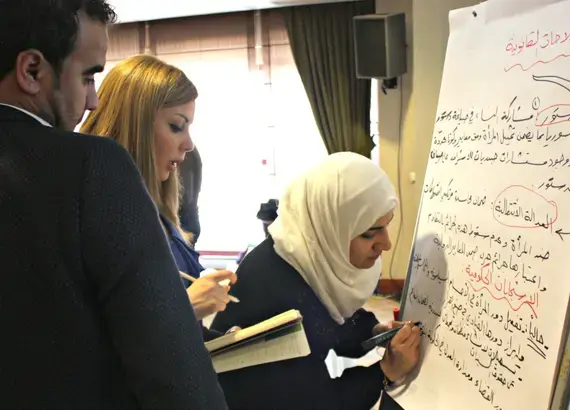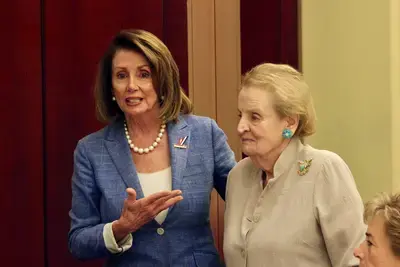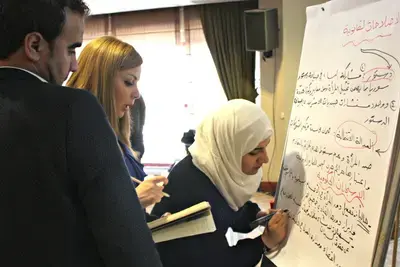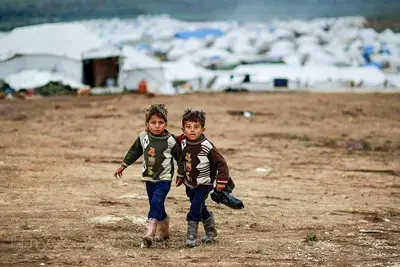
Syrian activists brainstorm next steps in addressing sexual violence within their communities
Success Story
NDI Forum Sheds Light on Sexual and Gender-Based Violence in Syria
Six years of conflict have taken a tremendous toll on the Syrian people, particularly women and girls. Not only is sexual violence used as a weapon of war, but the conflict has exacerbated many forms of violence against women and girls, from rape and sexual assault to forced and early marriages. Most communities have few resources to support survivors, with little medical or psychosocial care equipped to meet their needs, limited or non-existent judiciary and law enforcement institutions to pursue cases, a culture of impunity, and persistent stigmatization of survivors.
In this context, NDI is supporting Syrian human rights activists to raise awareness on women’s rights and sexual and gender-based violence (SGBV) in their communities. At a forum convened by NDI on March 19 in Gaziantep, Turkey, Syrian activists met with opposition leaders to discuss ways to address SGBV and empower women in Syria. With negotiations to end the conflict ongoing in Geneva, the forum also raised SGBV and women’s rights as priority concerns in peace and security processes.
Since June 2015, NDI-trained activists have led small group discussions of these topics in opposition-controlled areas of Syria, reaching more than 3,100 Syrian men and women. Activists are also assessing the needs for preventing violence and protecting vulnerable populations and SGBV survivors, leading local advocacy initiatives to respond to those needs, and connecting survivors with support resources.
During the March 19 forum, civil society activists shared their experiences in this field with decision-makers, including Ruba Habboush of the National Coalition of Syrian Revolution and Opposition Forces (SOC) and Deputy Prime Minister Mohamed Wajih Joumah of the Syrian Interim Government (SIG), commanders from the Free Syria Police, and representatives from local and provincial councils. NDI offered global context on violence against women in conflict and possible interventions for addressing SGBV.
“To find the solution, first we must face this courageously and admit that [SGBV] is happening,” said a participating civic activist.
Sandra Pepera, Director for Gender, Women and Democracy at NDI, emphasized the importance of women’s participation in decision-making to guarantee women’s rights, prevent SGBV, and protect survivors. She described how the meaningful inclusion of women at the negotiating table in peace and political transition processes—and the consideration of SGBV as a priority concern—are key to a sustainable resolution of conflict. “Your challenge,” she said, “is how to develop a political and governance framework that has the woman at the center.” Syrian stakeholders debated how to apply these principles to the Syrian context.
While SGBV is a sensitive subject and participants disagreed on its nature and prevalence in Syria, the forum sparked a dialogue among key stakeholders. “Even one case is one too many,” noted a representative from NDI’s local partner, Syria Bright Future.
The group agreed on the need to collaborate across sectors on efforts to address SGBV and to expand women’s access to decision-making in Syria. At the end of the forum, participants completed pledge cards, committing to expand roles for women in their respective institutions, including the interim government and local councils. For example, one commander in the Free Syria Police pledged to increase the numbers of female police on staff. “Today will be a step forward to genuinely address all of these issues because from here, we shed light on and open this dark box to find solutions,” remarked Deputy Prime Minister Joumah.
“This is just the beginning of our dialogue on addressing SGBV and expanding rights for women in Syria,” said Lauren Loveland, NDI Resident Senior Program Manager for Syria. NDI will continue to facilitate discussion and support activists in working with local decision-makers to address SGBV in this conflict and expand women’s rights in their communities.
This event built on a previous public forum, held in January 2016, in which decision-makers acknowledged the impact of sexual violence and the need to support, rather than stigmatize, survivors. This program is supported by the British Foreign & Commonwealth Office’s Rules-Based International System Fund.



